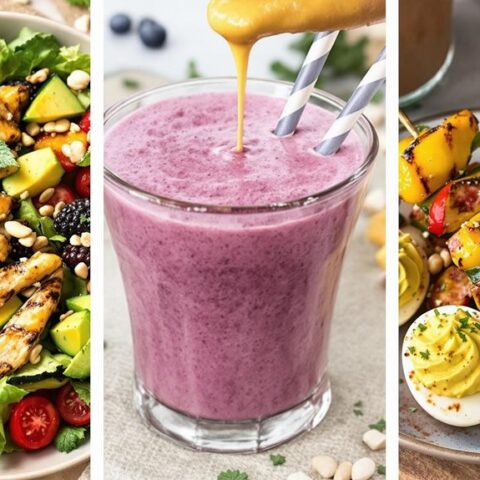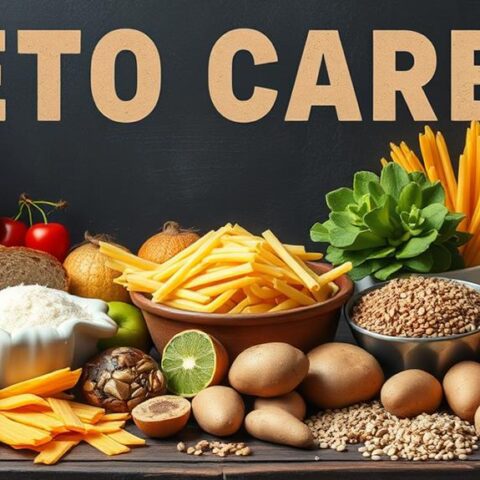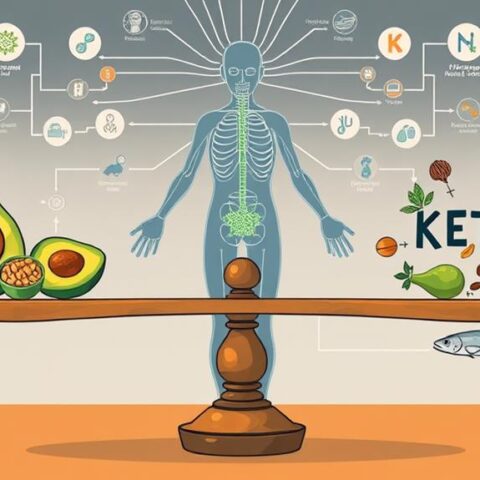
Huel is not inherently ketogenic due to its high carbohydrate content, particularly its standard range of 35–40% carbs. However, the Huel Black Edition offers a lower carbohydrate option at 17.78g per 100g, still requiring careful management for ketosis. To make Huel keto-friendly, individuals can modify it by adding sources of healthy fats like coconut oil, MCT oil, or nut butters, to achieve a higher fat percentage in adherence to ketogenic dietary principles. Despite these challenges, Huel's nutrient density and adaptability can be leveraged effectively within a keto regimen by strategically adjusting its macronutrient profile. Discover the nuances of using Huel on a keto diet.
Key Takeaways
- Huel Black Edition offers a lower carbohydrate content, making it more adaptable for a keto diet compared to other Huel products.
- Blending Huel with additional healthy fats, like MCT oil or nut butters, can help achieve the high-fat macronutrient ratio required for keto.
- Huel provides essential vitamins and minerals, supporting nutrient density while maintaining a keto-friendly diet.
- Precise calorie information in Huel aids in managing caloric intake, which is crucial for sustaining ketosis.
- Modifications in Huel's preparation can help shift macronutrient distribution towards keto compliance.
Understanding Keto Basics
The ketogenic diet, a high-fat, low-carbohydrate nutritional approach, is designed to shift the body's metabolism from glucose dependence to fat utilization, thereby inducing a state of ketosis. This metabolic state is achieved by drastically reducing carbohydrate intake to under 50 grams per day, which accounts for approximately 10% of daily caloric intake.
Studies have shown that the ketogenic diet can lead to weight loss and improved blood sugar and triglyceride levels. The macronutrient distribution of a typical ketogenic diet consists of 70% fat, 20% protein, and a minimal carbohydrate presence. This composition facilitates the conversion of body fat into ketone bodies, an alternate energy source for vital organs such as the brain and heart.
An important aspect of the ketogenic diet is the balance between high fat and protein intake. While fat is the primary energy source, adequate protein intake is essential to prevent muscle catabolism and support metabolic functions.
Consequently, the ketogenic diet requires careful planning to maintain the appropriate macronutrient ratios and total calorie intake. Foods commonly included are fatty fish, avocados, nuts, seeds, and low-carb vegetables, all supporting the diet's macronutrient goals.
Consulting with a healthcare professional before adopting such a restrictive diet is advisable to mitigate the risk of nutritional deficiencies.
Huel's Nutritional Profile
Many nutritional meal replacements, such as Huel, present a challenge for those adhering to a strict ketogenic diet due to their carbohydrate content. Huel's products typically consist of 35-40% carbohydrates, which can exceed the carbohydrate thresholds for individuals committed to maintaining ketosis.
For example, refined carbohydrates like those found in white bread and cooked pasta are known to swiftly convert to glucose, disrupting ketosis. However, Huel Black Edition offers a comparatively low carb Huel option, yet it may still not fully meet the stringent carbohydrate restrictions of a ketogenic regimen.
The carbohydrates provide around the majority of Huel's energy content, sourced primarily from oats and flaxseed, which are known to supply essential micronutrients but contribute to the heightened carbohydrate levels.
In addition to carbohydrates, Huel products present a balanced macronutrient profile, delivering 20-30 grams of protein per serving. This protein content, while beneficial for general nutrition, may surpass the moderate protein needs of a ketogenic diet, potentially affecting ketone production.
Moreover, the inclusion of high-glycemic sweeteners, such as sugar and maltodextrin, in some Huel formulations, poses a concern for maintaining ketosis, as these ingredients can spike insulin levels and hinder the metabolic state of ketosis.
Consequently, while Huel provides essential vitamins and minerals, aligning its nutritional profile with a ketogenic diet remains complex.
Carbohydrate Content in Huel
One important factor in evaluating Huel's suitability for ketogenic diets is its carbohydrate content. Generally, Huel products, such as Huel Ready-To-Drink, contain 35-40% carbohydrates. This high carbohydrate content renders them unsuitable for strict ketogenic diets, which typically necessitate a carbohydrate intake of less than 10% of total calories to maintain ketosis. While Huel Black Edition offers a lower carbohydrate content compared to other Huel products, it still comprises approximately 17.78g of net carbs per 100g serving. This level of carbohydrate intake can exceed the daily limit necessary for many keto dieters aiming to sustain ketosis.
| Product | Carbohydrate Content per 100g |
|---|---|
| Huel Ready-To-Drink | 35-40% |
| Huel Black Edition | 17.78g net carbs |
The carbohydrate sources in Huel, such as oats and flaxseed, are valuable for their essential micronutrients. However, they contribute considerably to the overall carbohydrate content, presenting challenges for those adhering to a ketogenic diet. Given the need for meticulous monitoring of carbohydrate intake in ketogenic diets, Huel's formulations may not meet the low-carb requirements vital for achieving ketosis. Consequently, individuals seeking meal replacements compatible with a ketogenic lifestyle might consider exploring alternatives specifically designed to align with low-carb dietary needs.
Modifying Huel for Keto
To tailor Huel for a ketogenic diet, adjusting the macronutrient ratios is essential, specifically by increasing the fat content and reducing carbohydrates.
Incorporating additional sources of healthy fats, such as desiccated coconut or nut butters, can effectively shift the caloric distribution to approximately 70% fat, aligning with keto dietary requirements.
This modification results in a meal composition that supports ketosis while still providing balanced nutrition.
Adding supplements like MCT oil can further enhance the ketogenic profile of Huel, making it more effective in maintaining ketosis.
Adjusting Macronutrient Ratios
For individuals following a ketogenic diet, adjusting macronutrient ratios is vital for maintaining ketosis, and Huel Black Edition can be modified to align with these dietary requirements. By blending 50g of Huel Black Edition with 50g of desiccated coconut, the macronutrient breakdown shifts to approximately 70% fat, 18% protein, and 12% carbohydrates. This formulation provides a total of 555 kcal, with only 16g of available carbs, thereby aligning with the keto diet's low-carb, high-fat model.
| Macronutrient | Amount (%) |
|---|---|
| Fat | 70% |
| Protein | 18% |
| Carbohydrates | 12% |
| Available Carbs | 16g |
The Huel Black's high protein content presents a consideration, as it may exceed the moderate protein needs typical in a keto diet, which can disrupt ketosis. Careful attention to additional fat sources is essential to guarantee the balance is sustained, as the original Huel formulations do not inherently meet the high-fat requirements of a strict keto diet. Consequently, incorporating healthy fats when preparing Huel Black is an effective strategy to tailor it to a ketogenic lifestyle, facilitating an ideal shift to and maintenance of ketosis.
Incorporating Additional Fats
Incorporating additional fats into Huel Black Edition is a strategic approach for individuals adhering to a ketogenic diet. This modification guarantees the meal aligns with keto's high-fat macronutrient profile by adding high-fat ingredients like desiccated coconut.
For instance, a blend of 50g of Huel Black and 50g of desiccated coconut results in a nutritional composition where approximately 70% of the calories derive from fat. This adaptation not only enhances keto compatibility but also maintains a caloric intake of around 555 kcal with a mere 16g of available carbohydrates.
For those committed to maintaining ketosis, it's critical to balance the macronutrient profile while using Huel Black. Despite its inherent nutritional density, Huel Black alone might not meet the stringent fat requirements of a ketogenic diet. Therefore, incorporating additional fats becomes necessary.
Here are three key considerations:
- Fat Proportion: Confirm that the bulk of caloric intake comes from fat to sustain ketosis.
- Carbohydrate Monitoring: Keep total carbohydrate intake between 20g to 30g daily to prevent exiting ketosis.
- Protein Balancing: Maintain appropriate protein levels to support bodily functions without hindering fat metabolism.
Implementing these adjustments allows Huel Black to effectively support ketogenic dietary goals.
Comparing Huel to Keto Options
When evaluating meal replacement options like Huel against ketogenic alternatives, it is essential to take into account their macronutrient compositions and dietary objectives.
Huel Black Edition, a variant designed to offer a lower carbohydrate content than its counterparts, still contains approximately 17.78g of net carbs per 100g serving. This level of carbohydrate content is considerably higher than the under 10% carbohydrate threshold necessary for a strict ketogenic diet.
The macronutrient profile of Huel Black is configured for balanced nutrition, encompassing carbohydrates, proteins, and fats, rather than aligning with the high-fat, low-carb paradigm of ketogenic diets.
In contrast, keto products such as Sure Keto and Left Coast Performance are formulated to comply with the stringent carbohydrate restrictions of ketogenic dietary plans. These products typically employ low-glycemic sweeteners, unlike Huel, which contains high-glycemic sweeteners like sugar and maltodextrin.
This distinction is critical for maintaining ketosis, as low-glycemic sweeteners are less likely to disrupt ketone production. Additionally, these keto-specific meal replacements prioritize calorie intake that supports a high-fat macronutrient profile, thereby enhancing their suitability for individuals adhering to ketogenic dietary protocols.
Consequently, for those pursuing a strict keto lifestyle, targeted keto products may offer greater compatibility.
Benefits of Huel on Keto
Adaptability is a key consideration for those exploring how Huel can fit into a ketogenic lifestyle. Huel Black Edition offers a pragmatic solution due to its lower carbohydrate content, providing only 17.78g of net carbs and an impressive 40g of plant-based protein per 100g serving. This composition aligns well with the macronutrient distribution required in a ketogenic diet, which prioritizes low carbs and high protein intake.
The improved insulin sensitivity associated with a ketogenic diet can be supported by Huel's precise nutritional balance. In addition to nutritional adequacy, the convenience of Huel facilitates adherence, especially for individuals with demanding schedules.
The benefits of incorporating Huel into a ketogenic regimen include:
- Nutrient Density: Huel's extensive nutritional profile guarantees that essential vitamins and minerals are supplied, counteracting potential deficiencies in a strict low-carb diet.
- Caloric Precision: With precise calorie information provided per serving, Huel supports calorie-controlled dietary planning, aiding in weight management while maintaining ketosis.
- Flexibility: Though not inherently keto, Huel can be adapted by adding high-fat ingredients like desiccated coconut, achieving the desired macronutrient balance for ketogenic needs.
Thus, Huel Black presents a versatile and efficient option, offering robust nutritional benefits while supporting the dietary requirements of a ketogenic lifestyle.
Challenges of Using Huel for Keto
When considering the ketogenic compatibility of Huel products, the high carbohydrate content—ranging from 35-40% in most variants—poses a significant challenge for those maintaining strict ketosis.
Unlike the Keto diet's specific macronutrient composition of 70-80% fat, 20-25% protein, and 5-10% carbohydrates, Huel's formulation can disrupt the metabolic state required for ketosis.
Sweeteners such as sugar and maltodextrin present in Huel can further complicate adherence by potentially elevating blood glucose levels.
These factors necessitate careful consideration and strategic modification for individuals attempting to integrate Huel into a ketogenic regimen.
High-Carb Content Concerns
Frequently, individuals following a ketogenic diet face challenges when incorporating products like Huel due to their high carbohydrate content. The core of these concerns lies in the difficulty of maintaining a state of ketosis, which is essential for the keto diet's effectiveness.
Huel products typically contain 35-40% carbohydrates, a composition incompatible with the low-carb requirement of keto. Although Huel Black Edition offers a reduced carbohydrate option, it still presents approximately 17.78g of net carbs per 100g serving. This level of carbohydrate intake can considerably impede the body's ability to remain in ketosis.
- Carbohydrate Intake Limits: Keto diets generally restrict daily carbohydrate consumption to 20-30g to sustain ketosis. Consuming Huel can easily surpass this threshold, disrupting the metabolic state.
- Net Carbs Impact: The net carbs in Huel Black, despite being lower, are still substantial enough to challenge the maintenance of ketosis for those strictly adhering to keto guidelines.
- Metabolic Balance: The high-carb nature of Huel may not align with the macronutrient balance necessary for achieving ketosis, posing a considerable hurdle for keto practitioners aiming to integrate Huel into their regimen effectively.
Sweeteners Affecting Ketosis
Sweetener composition plays a critical role in the effectiveness of maintaining ketosis, a key concern for individuals integrating Huel into a ketogenic diet.
Huel Black Edition incorporates high-glycemic sweeteners such as sugar and maltodextrin, which can greatly spike blood sugar levels. This elevation in glucose impairs the ability to achieve and maintain ketosis, a metabolic state essential for the ketogenic diet. The net carbs in Huel Black Edition stand at 17.78g per 100g, a figure that closely approaches or even surpasses the recommended daily carbohydrate intake of 20g to 30g for those adhering strictly to keto guidelines.
The presence of these high-glycemic sweeteners in Huel not only exacerbates the challenge of managing net carbs but also disrupts the appetite control typically afforded by ketosis. These sweeteners can lead to increased cravings and hunger, undermining the diet's effectiveness.
In contrast, keto-friendly options like stevia or erythritol do not impact blood sugar and support ketosis maintenance. As a result, individuals following a ketogenic diet might need to weigh alternative products or strategies to mitigate the impact of Huel's carbohydrate and sweetener profile on their dietary goals.
Frequently Asked Questions
Does Huel Put You in Ketosis?
Huel products, designed for meal replacement and weight management, primarily offer benefits through a balanced macronutrient profile. However, their carbohydrate content is too high to facilitate ketosis, a metabolic state achieved through low-carbohydrate, high-fat dietary intake.
How to Make Huel Black Keto?
To create keto-friendly Huel recipes, incorporate keto-friendly ingredients such as desiccated coconut and healthy fats. Focus on meal prep with nutritional balance, ensuring portion control, and exploring flavor variations to maintain macronutrient ratios conducive to ketosis.
Does Huel Have a Lot of Carbs?
Huel's nutritional breakdown reveals a high carbohydrate content primarily from oats and flaxseed. While offering dietary fiber and protein content, Huel's ingredients analysis shows it may not align with ketogenic guidelines, yet remains effective as a meal replacement for weight loss.
Does Huel Black Have Carbs?
Huel Black Edition contains approximately 17.78g of net carbs per 100g, primarily from oats and flaxseed. While offering diverse Huel nutrition and ingredients, it may not align with keto-friendly options for those prioritizing low-carb diets and meal replacement.
Conclusion
To summarize, Huel presents a viable option for those adhering to a ketogenic diet, provided modifications are made to align its macronutrient profile with ketogenic requirements. While Huel offers a balanced nutritional profile, its carbohydrate content necessitates careful adjustment to maintain ketosis. Comparatively, Huel may not inherently match specialized keto products, yet its benefits, such as convenience and thorough nutrition, can be advantageous. Challenges remain, particularly in ensuring consistent low-carb intake, requiring diligent monitoring and adaptation.










No Comments